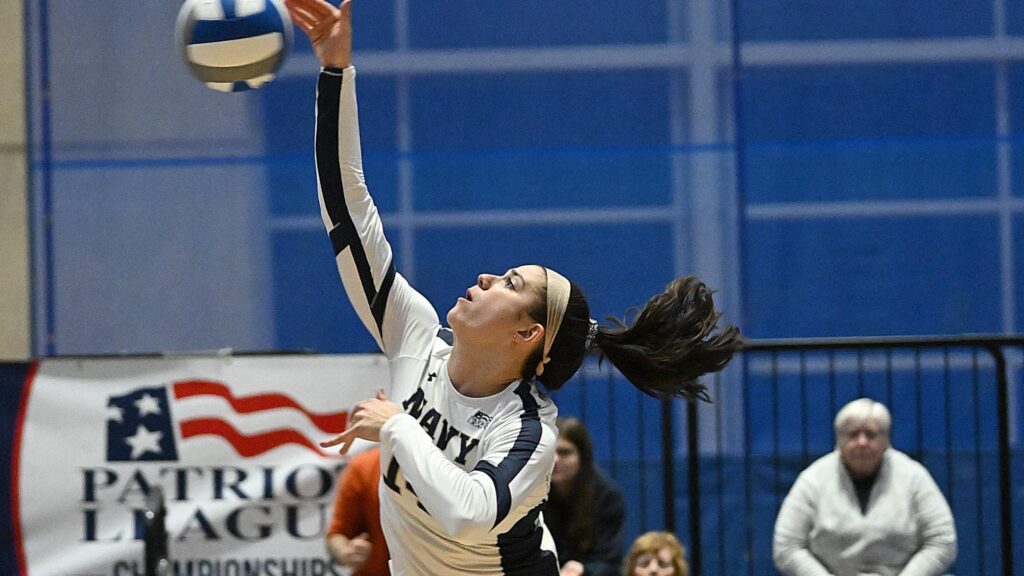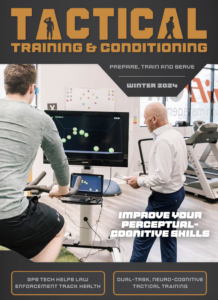Fall 2023
Strategies for training Midshipmen student-athletes

As strength and conditioning coaches, our goal is to help student-athletes excel at their individual sports by programming and coaching athletes through training regimens that target the specific physiological needs of that individual and their sport. This is only part of the requirement to coach at the United States Naval Academy (USNA).
Training Midshipmen at the academy requires a coach to remain cognizant of the student-athletes’ military obligations and recognize that oftentimes they have competing training requirements outside of their sport. This includes training to meet the Navy’s common physical fitness requirements and passing biannual Physical Readiness Tests (PRTs), preparing for mandatory summer training events, or training for specific assessments, known as screeners, for entrance into unique warfare communities, such as aviation, explosive ordnance disposal, the Marine Corps, and Naval Special Warfare (NSW) operators.
Perhaps most importantly, a Midshipman must maintain physical readiness throughout their career, which may exceed 20-plus years, so teaching the underpinning principles of exercise science takes on an outsized importance.

I think it is safe to say that training student-athletes at USNA comes with a learning curve and some unique pros and cons. You get a different breed of athlete at a service academy. They are disciplined and they work hard, often unequivocally. The issue is rarely that they are not doing enough, but rather that they need to pull in the reins because they are doing too much. Couple that with the uniqueness and variability in their training needs and you end up with a challenging, but overwhelmingly rewarding career in helping prepare our future military leaders.
Academic Year Programming
During the Academic year, I train each team for the physical and physiological demands of their specific sports, going through a periodized cycle of phases. However, their military obligations, like the PRT, can affect how we train at certain times of the year which would certainly be different if those obligations did not exist. There are also times when athletes are doing additional training on their own to prepare for their warfare community screeners. This can be contradictory to the needs of their sport. Midshipmen wanting to service select NSW or EOD must pass these screeners during their 2nd Class (junior) year. These typically involve strength endurance exercises, running, and swimming.
Summer Programming
Summer programming comes with its own set of challenges. We rarely see our athletes in the summer, which is pretty unique, especially at the Division 1 level. Not only do we not have access to them, but for several weeks of the summer, they are again, sufficing military obligations. Midshipmen attend PROTRAMID (Professional Training of Midshipmen) during their 3rd Class summer (summer going into sophomore year). This is a four-week training evolution that exposes the Midshipmen to an array of opportunities for Navy and Marine Corps officers. The Midshipmen spend a week in each community of Aviation, Surface Warfare, Submarine, and Marine Corps. This training is to give them a sense of each community and to help them identify which community they may want to service select in the future. During their 2nd Class summer (summer going into junior year) Midshipmen attend a surface or submarine cruise. As you can probably imagine, weight room equipment is pretty sparse on a ship or submarine. Lastly, during their 1st Class summer (summer going into senior year) Midshipmen choosing a service assignment in the Navy will attend a warfare cruise with their desired community, while Midshipmen hoping to go Marine Corps must attend and complete Leatherneck. Leatherneck is a 4-week training evolution that evaluates the Midshipmen on leadership, military skills, and physical training. The physical evaluations include a Physical Fitness Test (PFT), Combat Fitness Test (CFT), Obstacle Course, and Endurance Course.
While they are physically active, the type of training they are doing would not be comparable to the summer training you would normally have most of your athletes doing. For these reasons, I provide my athletes with summer programming that gives them options to complete what they can around their summer training obligations. This includes periodized strength and conditioning workouts that they could conduct if on leave with full access to a gym or weight room, a list of alternate exercises that they can swap out if the gym they have access to does not have all of the necessary equipment, strength/cardio circuits, plate circuits, and treadmill workouts for when equipment is limited, and lastly, body weight circuits for times when they have no access to equipment. My hope is that they complete as much of the periodized training as possible, and use the other options only when absolutely necessary.
Education
I think the most important aspect of training student-athletes at the Naval Academy is education. I am not only preparing them for their respective sports but also for military life after commissioning. Some of them may even find themselves tasked with conducting workouts for other sailors once in the fleet, so I want them to have an understanding of the training and why we do what we do. Many of them have a mindset that you need to beat yourself into the ground, be physically fatigued as you walk out, and be drenched in sweat in order for something to be considered an effective workout. Shifting that mindset and teaching them that in order to elicit certain training effects, we have to train certain ways; and that you are not always going to leave a workout fatigued, but that does not mean it was not effective. With that said, I would say our biggest educational piece is recovery. With them having team practices, team lifts, and then some training for other things outside of their sport, many do not get proper recovery or know how to recover. I like to explain the importance of off days and de-load weeks. We have an amazing nutrition department that educates them on proper fueling pre/post practice and pre/post competition, hydration, and general nutrition. We also address sleep and managing stress.
» ALSO SEE: Mass. State Police sees record dropout rate
As their coach, it is important for me to remember that while I am responsible for getting them stronger, faster, more explosive, more mobile, and helping to prevent injury, there are outside factors that can affect their training that I have no control over, and sometimes it is better to try to mitigate fatigue more than anything else. I understand that they were called here for a higher purpose, to serve their country and protect our freedoms. Simply put, there are some things that are more important than the wins and losses.



